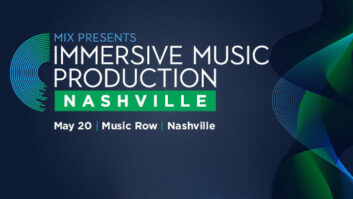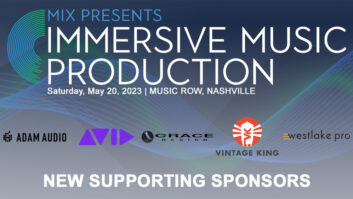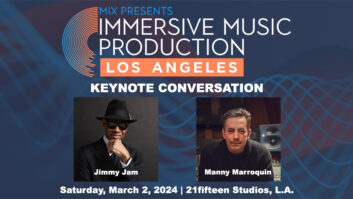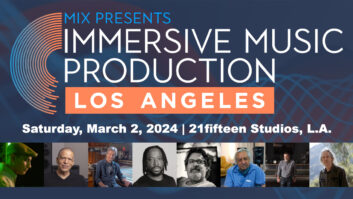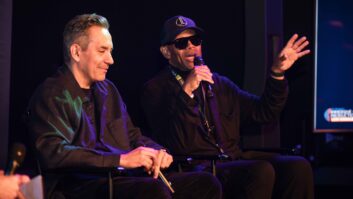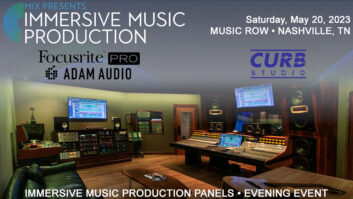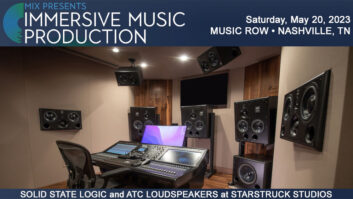E-mu has delivered a powerful new tool for desktop computer music production called the Audio Production Studio. This PCI-based audio card provides 64 voices of sampling, multitrack hard disk recording and quality, real-time DSP effects. Included is a drive bay input/output component that provides convenient left/right channel 11/44-inch inputs, a headphone jack and S/PDIF connections, all accessible from the front of the PC.
In addition, E-mu bundles a nice array of software and hundreds of sounds with the package. The E-mu software includes a mixer/control panel called E-Control, plus the SoundFont Bank Manager and SoundFont Librarian, for loading, unloading and previewing SoundFonts, and for creating and manipulating banks of SoundFont presets. Third-party software includes Vienna, Creative Labs’ SoundFont editor/creation program; Cakewalk Express Gold 6.0, a special version of Cakewalk’s sequencer supporting four digital audio tracks and automatic SoundFont loading; and Sound Forge XP 4.0, a full version of the popular Sonic Foundry audio editing program.
E-mu recommends at least a 200MHz CPU with 64 MB of RAM, running at a video resolution of 1,024×768. I installed and tested this card on an AMD-K6 200MHz machine using 128 MB of RAM running Win 98, and it performed exceptionally well. Plug-and-play installation made it easy to add the card to the last remaining slot in my computer.
The APS is basically a sampler combined with a stereo digital audio card for hard disk recording, and a multichannel effects processor and digital mixer. The APS can be combined with other audio cards to provide a 64-voice sampler and digital effects processing. Because the card does all of the processing, all 16 true stereo effects worked well together in real time. Each effect is controlled onscreen via an Effects Insert strip, and an effect can run on multiple strips by using one of four virtual aux buses. And again, because the card is doing the processing, all available inputs can be mixed down simultaneously without affecting CPU bandwidth.
I used the APS system with Cakewalk Pro Audio. However, my version 6.0 did not support the new SoundFont V.2.1, making it impossible to take full advantage of APS; I had to install the limited version of Cakewalk Express Gold in order to enjoy automatic loading of these new versions. (Cakewalk Pro Audio V.8.0 does sup- port V.2.1). If you are using Cakewalk Pro Audio V.6.0 software and don’t want to upgrade to V.8.0 or switch to the Cakewalk Express Gold package, you won’t be able to use the wonderful SoundFonts that come with the APS. Because the APS is a stereo sampling card, you can only record up to two tracks discretely, and since Cakewalk Express Gold only supports four digital audio tracks, you’d be better off upgrading to Cakewalk V.8.0 (or comparable, compatible software) if you want more than four digital audio tracks.
The APS CD-ROM contains more than 1,500 sounds, including 2MB and 8MB General MIDI banks, plus sounds converted from E-mu’s E-IV sampler library and selections of the Module Mania library. This includes samples from the original Proteus 1-2-3, Vintage Keys and Planet Phatt modules. The great thing about this card is it sounds like you’re playing a real instrument and not some cheap General MIDI sound card for gamers. When you’re playing 8MB samples from any of these modules, you’ll realize how cool it is to be able to load the same sounds straight off your PC that sell on $1,000 rackmount units!
The I/Os can all be used simultaneously. There are four mono analog (balanced) inputs, two analog (balanced) outputs, two stereo digital (S/PDIF) inputs, and two stereo digital (S/PDIF) outputs. That’s a nice feature. I do have some concern about the S/PDIF settings, though. They are set for 20-bit resolution at a 48kHz sample rate. The digital inputs have asynchronous sample rate converters (SRCs), which allows them to accept a digital audio stream anywhere between 28 and 53 kHz and convert it to the professional 48kHz sample rate that the APS runs at. That’s great for inputs, but the output is locked at 48 kHz. This makes for lengthy software-based SRC via a program like Sound Forge in order to output to a different sample rate, such as 44.1 kHz. This means you will not be able to burn a CD directly from the S/PDIF outputs on the APS without potentially destructive sample rate conversion down to 44.1 kHz via your mixdown program. I suggest you use the APS only in 48kHz mode and perform the SRC during the final mix. E-mu’s Web site (www.emu. com) includes an explanation of why they chose a 48kHz rate, and other information on sample rate conversion. While you’re there, check out additional available sounds, including third-party sounds in SoundFont format.
E-mu has produced an excellent audio/sampler card with a lot of wonderful features. Allocating system RAM to play 8MB SoundFonts is a nice feature and lets me enjoy pre-made (as well as my own) high-quality sounds without spending a fortune on rackmountable modules. I would probably never invest in the Planet Phatt library as a standalone unit for my needs, yet there are some great sounds from that product on the CD packaged with the APS that I will definitely use.
I would have no problem recommending the APS to anyone who wants to dive into digital home recording, sequencing, sampling or other music production on a PC. For the suggested list price of $699.99, it’s a really good deal, even if you’re only using it for its powerful sampling and MIDI capabilities.
E-mu-Ensoniq, 1600 Green Hills Road, Scotts Valley, CA 95067. Phone 408/438-1921; fax 408/438-8612; Web site: www.emu.com.
